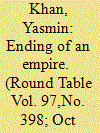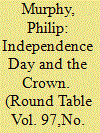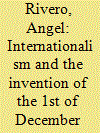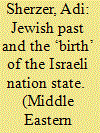| Srl | Item |
| 1 |
ID:
084254


|
|
|
|
|
| Publication |
2008.
|
| Summary/Abstract |
The ritual and rhetoric of Independence Day celebrations in New Delhi and Karachi masked confusion about the kinds of state coming into existence and complex new questions about nationality and citizenship that would take a long time to resolve
|
|
|
|
|
|
|
|
|
|
|
|
|
|
|
|
| 2 |
ID:
084250


|
|
|
|
|
| Publication |
2008.
|
| Summary/Abstract |
The role of members of the royal family at independence ceremonies deserves more attention. There was a widely accepted hierarchy of royals. The aspirations of new states, the fears and concerns of the Palace and the Colonial Office and gender issues all affected decisions and arrangements. This study reinforces David Cannadine's ornamentalist view of empire
|
|
|
|
|
|
|
|
|
|
|
|
|
|
|
|
| 3 |
ID:
120369


|
|
|
|
|
| Publication |
2013.
|
| Summary/Abstract |
This article explores competing histories of independence in Côte d'Ivoire. The 2010 commemoration of fifty years of independence led to competing histories about how and if the nation achieved independence in 1960. The postelectoral crisis of 2010-2011 that followed soon afterwards has been interpreted by supporters of the outgoing president Laurent Gbagbo as an attempt by France and the international community to re-colonise Côte d'Ivoire. The article asks how different versions of this history are connected to different political projects and how they have changed through time. The article will analyse these processes of meaning-making in a historiology of Ivorian independence, thus contributing to constructivist accounts of nationhood, collective memory and historiography. The paper thus argues that different media of recalling the past in the present, such as commemoration and historiography, should be studied in a complementary manner to understand how (joint) remembering and forgetting are tools and mirrors of nations at work.
|
|
|
|
|
|
|
|
|
|
|
|
|
|
|
|
| 4 |
ID:
109166


|
|
|
|
|
| Publication |
2011.
|
| Summary/Abstract |
Portuguese national identity was consciously recreated during the 1860s, and a full programme of national identity socialisation was devised. At the core of this project was the proposal to celebrate the 1st of December as the 'Restoration of Independence Day'. The goal of the National Association 1st of December 1640, which was founded in 1861, was to combat cosmopolitanism, internationalism, and Iberianism, and highlight to the outside world, in general, and to the Portuguese 'traitors' in particular, the determination of the Portuguese people to retain their independence. To fulfil this purpose, it was felt necessary to awaken the soul of the Portuguese people by remembering the sufferings of the nation under the yoke of Spain, which lasted from 1580 and 1640, and the national jubilation that accompanied the restoration of freedom. This article argues that, contrary to what is stated in the vast majority of nationalist literature, the original celebration of the 1st of December should not be seen as a response to the Spanish threat of annexation, but rather as a mechanism to prevent attacks against the royal house and the regime it stood for both at home and abroad.
|
|
|
|
|
|
|
|
|
|
|
|
|
|
|
|
| 5 |
ID:
177701


|
|
|
|
|
| Summary/Abstract |
The article focuses on David Ben-Gurion’s past image using a series of programmatic and widely distributed speeches he made during Israel’s first Independence Days (1948-1958). The article argues that while the founding of the state was defined as a turning point it was certainly not portrayed as a ‘beginning’, and that both the ancient sovereign and the exilic Jewish experience had a central place in Ben-Gurion’s relevant past. At the centre of discussion stand five main characteristics of the speeches: the continuation between the state and the Jewish ancient past; the central place of a secularized messianism as a bridge between the exilic past and the sovereign present; the attempt to portray a widely accepted shared past using consensus-based terminology; the simplification of the Zionist rebellion against the exile; and the fundamental differentiation between the Jewish symbolic past and the realistic Israeli present. These five elements are analysed against the background of other texts by Ben-Gurion and his image in the research. Finally, this case study is placed within a wider context which demonstrates the Israeli quest for a Jewish framework of meaning that would authenticate the new national myths and charge them with meaning.
|
|
|
|
|
|
|
|
|
|
|
|
|
|
|
|